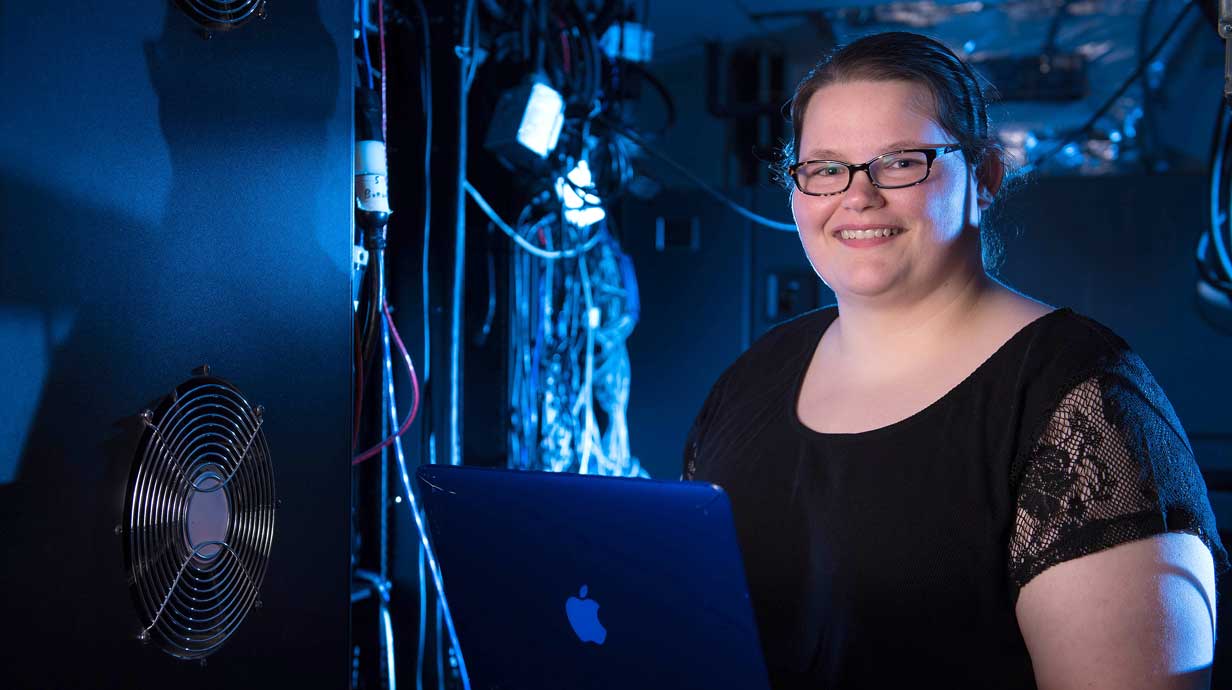Chemistry, Ph.D.
Prepare yourself for employment as a professional chemist in academia, industrial, or government research laboratories, and more.

About the Ph.D. in Chemistry
The Department of Chemistry & Biochemistry in the College of Liberal Arts offers the Ph.D. in Chemistry. It is designed for those who intend to seek employment as a professional chemist in academia, industrial, or government research laboratories, or in other vocations where specialized knowledge in chemistry is desired or required.
On this Page…
Program Information
Degree
Ph.D. in Chemistry
Required Credit Hours
54
Program Type
Doctorate Program
Program Location
School
We’re Here to Help!
If you have any questions about the Ph.D. in Chemistry, don't hesitate to get in touch!
Ryan Clifton Fortenberry
Associate Professor of Chemistry and Biochemistry
Ph.D. in Chemistry Program Details
Learn about the application process, academic requirements, financial support, and the facilities available to you.
APPLICATION DEADLINE: Review begins in December with a deadline on April 1
The Department of Chemistry and Biochemistry welcomes student applications.
- Complete the Graduate School’s Online Application.
- Upload Supplemental Application materials for the Department of Chemistry & Biochemistry to the link provided on the application.
To be admitted to a graduate degree program in full standing, a student must have completed a B.S. degree in chemistry with an average grade of B. Exceptionally qualified students who have not completed a B.S. degree in chemistry but have a degree in a related field (such as biology, engineering, physics, pharmacology, or pharmacy) may be admitted. However they should expect to present a clear case in their personal statement for admission. Additionally, they should expect to be provisionally admitted until specified conditions are satisfied such as prerequisite coursework or other expectations.
Students in the Ph.D. program complete 54 credit hours of graduate coursework.
- 18 credit hours of chemistry courses
- Chem 700:
- 3 hours of seminar (Chem 750 and 759)
- 18 hours of dissertation (Chem 797)
Credit for previous graduate-level course work may be applied toward these requirements at the discretion of the student's advisory committee and with approval by the department chair. A minimum grade of B is required in each course in the student's area of specialization.
All Ph.D. students must take one core course from each of four of the five specialty areas.
Analytical Chemistry:
- Chem 512: Advanced Instrumental Analysis
- Chem 514: Fundamentals of Electrochemistry
- Chem 519: Chemical Separations
Biochemistry:
- Chem 534: Physical Biochemistry
- Chem 771: Biochemistry I
Inorganic Chemistry:
- Chem 544: Chemical Applications of Group Theory
- Chem 701: Advanced Inorganic Chemistry I
- Chem 702: Advanced Inorganic Chemistry II
Organic Chemistry:
- Chem 527: Adv. Organic Chem., Structural Mechanism
- Chem 528: Adv. Organic Chem., Structure Synthesis
Physical Chemistry:
- Chem 531: Advanced Physical Chemistry, Quantum Chemistry
- Chem 532: Chemical Thermodynamics
- Chem 536: Advanced Physical Chemistry, Reaction Dynamics
A cumulative average of not less than B is required in the core courses. A minimum grade of B is also required in each course in the student's area of specialization. In addition, Ph.D. students
- make three seminar presentations
- must pass a minimum of four cumulative examinations
- create and defend a 10-15 page research proposal/dissertation prospectus
- write and defend a dissertation
Teaching and research assistantships are available to qualified applicants. Students with a graduate assistantship funded in the department receive:
- a scholarship that covers some or all of the tuition and non-residency fee, if applicable, for regular semesters
- subsidized health insurance.
For more information, visit Graduate Programs in the Department of Chemistry and Biochemistry.
The Graduate School's financial aid webpage lists a variety of funding possibilities, including summer support and a recruiting fellowship program that promotes academic excellence and access to graduate education.
The Department of Chemistry and Biochemistry is located in Coulter Hall, which houses teaching and research laboratories and a machine shop including glass blowing equipment.
The Science Library, housed in the Thad Cochran Research Center adjacent to Coulter Hall, contains more than 20,000 chemistry books and journals and subscribes to more than 140 chemistry research journals.
The department also benefits from the presence of several other on-campus research programs and facilities.
- Mississippi Center for Supercomputing Research
- National Center for Physical Acoustics
- National Center for Natural Products Research
- School of Engineering
- Nano-Bio ImmunoEngineering Consortium (NIEC)
Department of Chemistry and Biochemistry
Department Video
Hear firsthand from students and faculty about the Chemistry program.Next Steps
Explore Affordability
We have a variety of scholarships and financial aid options to help make college more affordable for you and your family.
Apply to the University of Mississippi
Are you ready to take the next step toward building your legacy?
